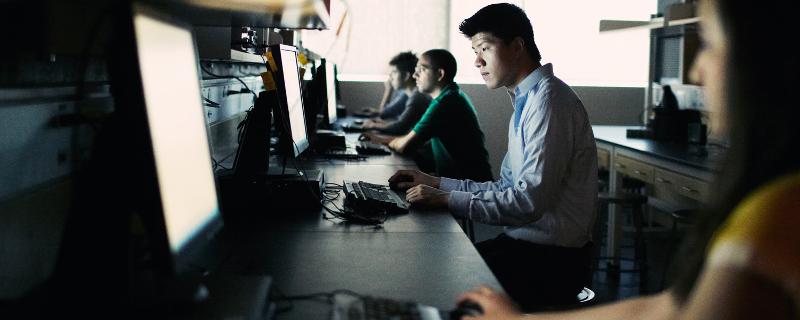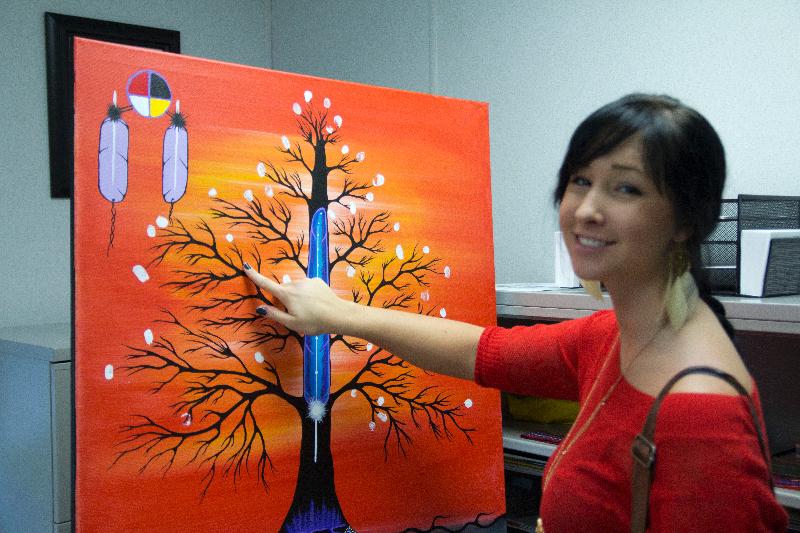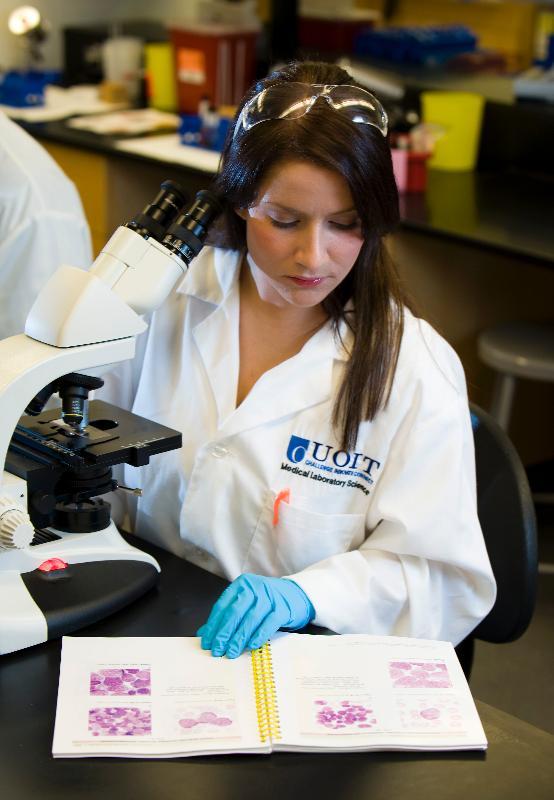 It is your responsibility as a student to understand when and how to cite and reference sources and to understand the rules of whichever citation style you are required to use.
It is your responsibility as a student to understand when and how to cite and reference sources and to understand the rules of whichever citation style you are required to use.Consequences of Academic Dishonesty
If you are caught for any type of cheating, whether it is plagiarism, cheating in a test or exam, faking your results, or some other academic misconduct, you will face sanctions (or penalties). Depending on the nature of your academic misconduct, you will go through one of two possible processes and face different consequences.
All forms of cheating are academic dishonesty. If you commit academic dishonesty, depending on the severity (and frequency) of your offence(s) you could: fail your assignment, fail your course or even be suspended from your program, your faculty, or UOIT for up to three years, during which time you won't be able to transfer any credits earned at another university during your suspension towards any UOIT degree requirements or receive any funds from the university. You could also be placed on disciplinary probation for the remainder of your program. Offences are kept on file in the Registrar's Office, but more serious offences will also be recorded on your transcript for at least three years. After three years, you can appeal to have the notation on your transcript removed.
That sounds pretty bad. What's the process for dealing with alleged cheaters here at UOIT?
Well, every case is different, but your Professor might talk to you about the allegation first to determine all the facts. Lesser Offences (first offence on an assignment worth 25% or less of the total course grade) are dealt with by the course professor or instructor. Major Offences, however, are dealt with by the Dean (or Dean's representative) of the Faculty in which the course is offered. Most Faculties have an Academic Integrity Committee that represents the Dean in dealing with academic misconduct.
*Note: during the review and investigation of the offence, you cannot drop the course in which the offence took place. Until a decision is made, you should continue to register and attend all classes as usual.
I've heard people claim that they accidentally committed plagiarism. How could you accidentally cheat, and what's the difference between accidental plagiarism and intentional plagiarism?
Accidental Plagiarism might occur when you do not really understand how to properly paraphrase, quote and cite your research. Not knowing the proper method of documentation can result in students misattributing someone else's words or ideas as their own. In other words, if you have paraphrased research from a book or an article or a website, but you do not include an in-text citation, the reader will assume that the idea and/or words are yours, not someone else's. Even if you include the name of the source in your reference list at the end of the essay, the missing in-text citation makes it plagiarism.
 It is your responsibility as a student to understand when and how to cite and reference sources and to understand the rules of whichever citation style you are required to use.
It is your responsibility as a student to understand when and how to cite and reference sources and to understand the rules of whichever citation style you are required to use.
Intentional Plagiarism is the act of deliberately using and presenting someone else's work as your own original work. This would include buying papers online, as well copying & pasting information from sources directly into your essay or assignment without quotation marks, in-text citations and/or references. However, whether a person intentionally or unintentionally plagiarizes, both will have consequences. Not knowing is not an excuse.
How can I avoid accidental plagiarism?
Take good notes. Make sure to write down all the bibliographic information (including URLs and page numbers) and keep the information with your notes. If you copy word-for-word from the source, use quotation marks so you know that the words are not your own and make note of the page number. If you paraphrase information, you don't need quotation marks, but still make note of the page number and complete bibliographic information so you can easily find it again if you need to.
Create your bibliography or reference list as you work to help keep track of where you found your information. Some people like to use different colours of ink or highlighting when writing to help keep track of what you think and what other researchers say. (Don't forget to create a legend so you remember what each colour represents.)
But how could I intentionally plagiarize someone else's work? Wouldn't it be obvious to me that I was stealing someone else's words or ideas?
Not necessarily. Being confused or disorganized can easily lead to accidental plagiarism. For example, not knowing or understanding how to paraphrase or use quotations properly, how to cite and reference sources, what the rules are for a specific citation style, and so on, means that you can easily make a mistake.
Not knowing the proper method of documentation can result in misattributing credit. Also, it's very easy to just forget where parts of the information you are gathering came from and what parts of your notes are in your own words and what sections are properly paraphrased. It is your responsibility as a student to understand and to know when to cite and reference sources and to understand the rules of whichever citation style you are required to use.
Remember, accidental plagiarism is just as serious as intentional plagiarism. They will both result in sanctions.
It is very likely that you would be caught. There are many web-based tools for checking the originality of someone's work. At UOIT, we use Turnitin.com. With more and more information being uploaded to the internet (including academic articles and student assignments), it is becoming more and more difficult to get away with even so much as improperly paraphrasing a few sentences from a source without being caught. Also, experienced professors can detect inconsistencies in student work, and they can ask for copies of your rough work at any time. You are obligated to give it to them in order to prove that your work is original and properly cited. Always keep copies of your research notes and rough essay drafts until after the end of the term.
If that's true then why would anybody even bother cheating or plagiarizing?
One of the most common excuses for plagiarism is ignorance (i.e.: "I didn't know how to paraphrase, reference, cite, etc." OR "I don't know how to write a proper academic paper!"). Another common claim is that the work was based on all their own ideas, and that any similarities between their work and someone else's is purely coincidental - which is very unlikely.
Here are a few other reasons:
No matter how stressed or pressed for time you are, it is always better to do the best you can honestly, rather than relying on any form of cheating. When you do your own work, you will demonstrate strong ethics, improve valuable academic skills and build a solid foundation of knowledge for the future.
 The best plan is to avoid getting yourself into trouble by planning your time and working hard. UOIT has lots of student support services for students struggling with difficult issues.
The best plan is to avoid getting yourself into trouble by planning your time and working hard. UOIT has lots of student support services for students struggling with difficult issues.
For example, Student Accessibility Services can help if you have a learning or physical disability. If you are feeling depressed, stressed or anxious, the Student Mental Health Services can help. Outreach Services at DC & UOIT's Student Association have a women's centre, space for LGBTQ support, and a food bank, among other services. For advice on planning your timetable, which courses to take, whether you should drop a course, and so on, you can also talk to an Academic Advisor in your Faculty. In addition, TAs or Professors can be helpful. If you're having trouble with developing skills in analytical reading, writing, paraphrasing, or data interpretation, the university's Student Learning Center can provide help.
I submitted a group project recently and just got an email saying that there is evidence of plagiarism in it. I am always really careful with my research and writing, but what if someone else in my group did something wrong? What will happen to me?
 Well, you could be charged with plagiarism if no one in your group takes sole responsibility and says you weren't involved. You are responsible for any work submitted with your name on it. Therefore, if one of your group members decides to plagiarise, it will impact on the whole group. Unless the person who plagiarised comes forward and takes full responsibility, everyone could receive a sanction. It is really important for final versions of group projects to be submitted to TurnItIn (or another plagiarism detection system) before it is handed in.
Well, you could be charged with plagiarism if no one in your group takes sole responsibility and says you weren't involved. You are responsible for any work submitted with your name on it. Therefore, if one of your group members decides to plagiarise, it will impact on the whole group. Unless the person who plagiarised comes forward and takes full responsibility, everyone could receive a sanction. It is really important for final versions of group projects to be submitted to TurnItIn (or another plagiarism detection system) before it is handed in.
When you start a project, make sure everyone in the group understands what academic integrity is and how to avoid plagiarism (or academic dishonesty in general). As you are working, if you notice that someone's contributions seems suspicious (for example, if the level of writing seems too sophisticated compared to previous work, if they haven't cited many sources, or if their sources don't match-up with what they're writing about), talk to your professor or TA.
Depending on the circumstances, the offence could be considered either a major or lesser offence. You will either meet with the instructor or with an Academic Integrity Committee. Be prepared to provide as much information and evidence as you can about what you contributed to the project - keep good track of all your work as you do your research and writing.
What kind of evidence would prove that I did my own work?
When you do your research, keep good notes, either on paper or on your computer. When you are writing the essay or assignment, keep copies of the different versions or drafts (i.e., use 'save as' to save the different drafts and number them draft_1, draft_2, etc.).
I've heard that not all cases of academic offences are dealt with in the same way. How do I know what will happen under different circumstances?
That's true. While all misconduct is serious, some offences are clearly more serious than others. The less serious problems are called Lesser Offences, while the others are called Major Offences.
A lesser offence is the first offence on an assignment worth 25% or less of the total course grade. A major offence is a repeated offence or a misconduct on an assignment worth over 25% of the total course grade or cheating on an exam.
My TA has told me that I have some plagiarism in my essay and that I have to meet with the professor. What is going to happen?
Lesser Offences are dealt with by the course instructor. The instructor must report the offence to the Dean and to the Registrar's Office. The instructor will meet with the student to discuss the problem. If it is a Lesser Offence, the instructor will impose a sanction (or penalty) appropriate to the situation. A sanction might be a deduction in your grade, a requirement to rewrite the assignment, or a zero on the assignment. You will also be asked to sign a form that outlines the circumstances. By signing the form, you are stating that you understand that what you did was academic misconduct and that you agree to the sanction. The report is kept on file for 3 years, but no notation is made on your transcript. If you disagree with the instructor, you may choose not to sign the form and have the case heard by the Faculty's Academic Integrity Committee.
NOTE: If you commit another act of misconduct, it will be your second (or more) offence and the sanction(s) will be more severe.
I've just received a letter from an Academic Integrity Committee saying I have been accused of violating the academic integrity policy and that I have to meet with someone about it. I'm scared and don't really understand what's going on!
It sounds like you are suspected of having committed a major academic offence. An offence is considered major if you have already had a prior offence OR if the assignment in question is worth more than 25% of the total course grade or if it is a final exam.

Major Offences are dealt with by the Dean (or Dean's representative) of the Faculty in which the course is offered. Most Faculties have an Academic Integrity Committee that represents the Dean in dealing with academic misconduct. You will be asked to meet with two or more members of the Academic Integrity Committee. The letter or email that you received will include all the information that the course instructor provided to support the allegation of misconduct. Read this material carefully. Always respond to the letter or email to indicate that you have received the information and that you will meet with the committee at the appointed time.
What will happen at the meeting?
At the meeting, you are allowed to bring an advisor (who could be a friend, a parent or someone else that you trust). Always inform the committee that you are bringing someone and who it is. At the meeting, you will be given the chance to tell your side of the story—what happened, why it happened, and so on—anything that you feel is relevant to the case. For example, you may explain whether or not you believe you are guilty and your explanation of what happened. You may be asked questions to help clarify the situation. The committee members will respond to your statement, possibly to explain the problem in greater detail or to elaborate on why you were brought to the committee. You may ask questions and elaborate on the details further. Once the discussion is finished, you will be able to leave.
The committee will review all of the details of the case and the evidence (including all relevant information on the assignment in question, writing samples, and records from meetings with you, as well as records of any past incidences of academic dishonesty), in order to come to a decision on whether there is reasonable evidence that you committed an offence and what sanction, if any, will be imposed.
Occasionally, a committee will determine that no offence was committed and the case will be dismissed. However, most instructors do not send cases to the Academic Integrity Committee unless they are quite certain that an offence was committed. If there is any doubt, professors may meet with you prior to sending the case to the committee in order to determine the facts of the case.
The sanctions for academic misconduct range in severity depending on the nature of the misconduct, the year the student is in, whether or not it is a first, second or third offence, and so on. The university treats its students fairly and students always have the opportunity to explain what happened. Possible sanctions include: 
A record of the incident and ruling will be kept by your Faculty and the Registrar's Office so they can make appropriate notes on your academic record. In most cases, the record will only be provided to other UOIT offices on a need-to-know basis, but any failing grades will be evident on your academic transcript. In addition, a notation of academic misconduct may be placed on your transcript as part of a sanction for a minimum of three years. To have it removed after three years, you must submit an appeal to the university. For more details on the policy, see the Academic Calendar (Section 5).
What are the student's rights in this process?
With respect to all accusations of academic dishonesty, students are presumed innocent until the contrary has been established. Decisions reguarding the commission of such an offence are based on the balance of probabilities. If a lesser offence is unresolved between the faculty member, the matter is forwarded to the Dean (or Dean's representative).
What happens if an unresolved case is forwarded to the Dean?
Cases can be dealt with an informal or formal resolution process. In all cases, a record of proceedings is kept on file and similar sanctions will be imposed.
It depends. If you signed an Agreement on a Lesser Academic Offence, then you have agreed that you committed the offence and that you accept the sanction. If you did not sign the Agreement on a Lesser Academic Offence or if you received a sanction for a Major Academic Offence, then you have the right to appeal any decision. However, you are only allowed to appeal under certain circumstances. You may appeal a decision within 10 working days of the original faculty-level decision. Appeals can only be made based on:
within 10 working days of the original faculty-level decision. Appeals can only be made based on:
Your appeal must contain:

There are many web-based methods of checking for the originality of somene's work. At UOIT, we use Turnitin.com. With more and more information being uploaded to the internet, it is becoming more and more difficult to get away with even so much as improperly paraphrasing a few sentences from a source without being caught. There are also highly effective, low-tech ways of detecting plagiarism. Experienced professors can detect inconsistencies in student work, and they can ask for copies of your rough work at any time. You are obligated to give it to them in order to prove that your work is original and properly cited. Always keep copies of your research notes and rough essay drafts until after the end of the term.
being uploaded to the internet, it is becoming more and more difficult to get away with even so much as improperly paraphrasing a few sentences from a source without being caught. There are also highly effective, low-tech ways of detecting plagiarism. Experienced professors can detect inconsistencies in student work, and they can ask for copies of your rough work at any time. You are obligated to give it to them in order to prove that your work is original and properly cited. Always keep copies of your research notes and rough essay drafts until after the end of the term.
UOIT reserves the right to utilize electronic means to help prevent plagiarism. UOIT has purchased a license from Turnitin.com, a plagiarism prevention service to assist faculty in determining whether plagiarism may have occured. Turnitin.com is a plagiarism detection system that utilizes proprietary search technology to check papers against internet resources, proprietary databases, and previously submitted student papers. As part of its license agreement with UOIT, Turnitin.com will purge its database of all UOIT student papers at the end of five years.Faculty members are not compelled to use Turnitin.com, but it is available as a tool. If faculty members are going to use Turnitin.com, students must be notified in class at the beginning of the semester.
Students are not compelled to submit assignments to Turnitin.com. If a student objects to the use of the service, he or she must inform the faculty member within two weeks of the start of the course. They must also submit a Turnitin.com Assignment Cover Sheet along with their assignments which should be accompanied by any additional documents the professor requires.The student may transfer out of the course, or, if the faculty member agres, the student may use an alternative method acceptable to UOIT for verifying the originality and integrity of assignents. Most often, instructors will want to see reseach notes and multiple rough drafts of your essay that demonstrate that you did your own work.
Instructions: Answer all the questions and click submit at the end. You can download or print your grade summary and certificate of completion.
